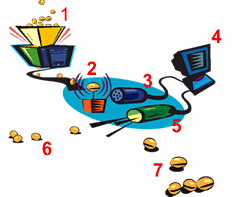This page has been archived and is being provided for reference purposes only. The page is no longer being updated, and therefore, links on the page may be invalid.
|
Read the magazine story to find out more. |
|
|
"Pistachio Blaster" Listens for Perfect Nuts
By Marcia WoodNovember 8, 2004
Shells of perfectly ripened pistachios split open naturally, revealing a rich-tasting, lime-green kernel that's ready to roast and enjoy. Nicknamed "laughing pistachios" because they look like they're smiling at you, open-shell nuts typically make up about 78 percent of the U.S.-grown harvest.
Now, a high-tech sorter developed by the Agricultural Research Service quickly segregates lower-value, closed-shell nuts from high-value, open-shell pistachios, with about 90 percent accuracy. ARS agricultural engineer Thomas C. Pearson invented this super-sorter, called the Pistachio Blaster, while at the agency's Western Regional Research Center at Albany, Calif. He's now with the ARS Grain Marketing and Production Research Center at Manhattan, Kan. ARS is the U.S. Department of Agriculture's chief scientific research agency.
The Blaster is designed to reduce losses otherwise caused when sorting machines make errors, misdirecting premium, open-shell pistachios into bins of closed-shell nuts. Performing at the respectable speed of about 25 nuts per second, the Blaster doesn't damage nuts and can pay for itself in less than a year.
In a sequence of steps that occur faster than the blink of an eye, the Blaster analyzes sounds made during and immediately after each nut strikes a polished stainless steel block. Those sounds, first captured as electrical signals by a precisely positioned directional microphone, are sped to a personal computer, where they're converted into digital data--some 350 pieces of information, or data points, for each nut.
The computer distinguishes the distinctive sound pattern made by the impact of a closed-shell pistachio from that of an open-shell nut. When this analysis reveals the telltale sounds of a closed-shell nut's bounce, the computer sends a signal that causes a blast of compressed air to direct the nut to the reject bin.
One of the nation's largest pistachio processors, Setton Pistachio of Terra Bella, Calif., holds a license for the patented Blaster and is already using several of these novel machines.
Read more about the research in the November issue of Agricultural Research magazine.

